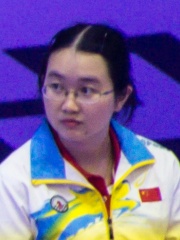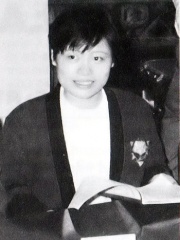
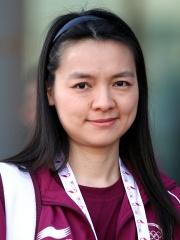
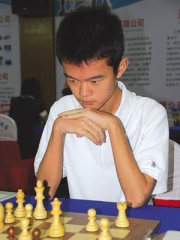
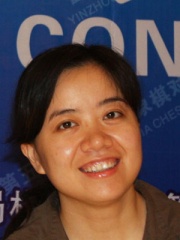
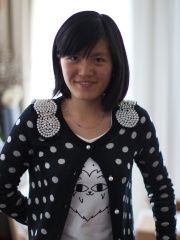
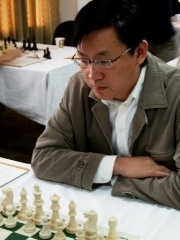
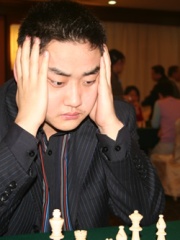

The Most Famous
CHESS PLAYERS from China
This page contains a list of the greatest Chinese Chess Players. The pantheon dataset contains 461 Chess Players, 23 of which were born in China. This makes China the birth place of the 5th most number of Chess Players behind Hungary, and United States.
Top 10
The following people are considered by Pantheon to be the top 10 most legendary Chinese Chess Players of all time. This list of famous Chinese Chess Players is sorted by HPI (Historical Popularity Index), a metric that aggregates information on a biography's online popularity. Visit the rankings page to view the entire list of Chinese Chess Players.

1. Xie Jun (b. 1970)
With an HPI of 51.96, Xie Jun is the most famous Chinese Chess Player. Her biography has been translated into 41 different languages on wikipedia.
Xie Jun (born October 30, 1970) is a Chinese chess grandmaster and is the first Asian woman to become a chess grandmaster. She had two separate reigns as Women's World Chess Champion, from 1991 to 1996 and again from 1999 to 2001. Xie is one of three women to have at least two separate reigns, besides Elisaveta Bykova and Hou Yifan. Xie Jun is the current president of the Chinese Chess Association. In 2019, she was inducted into the World Chess Hall of Fame.

2. Zhu Chen (b. 1976)
With an HPI of 51.56, Zhu Chen is the 2nd most famous Chinese Chess Player. Her biography has been translated into 42 different languages.
Zhu Chen (simplified Chinese: 诸宸; traditional Chinese: 諸宸; pinyin: Zhū Chén, Arabic: زو تشن; born March 13, 1976) is a Chinese and Qatari chess grandmaster. In 1999, she became China's second women's world chess champion after Xie Jun, and China's 13th Grandmaster. In 2006, she obtained Qatari citizenship and since then has played for Qatar.

3. Ding Liren (b. 1992)
With an HPI of 51.41, Ding Liren is the 3rd most famous Chinese Chess Player. His biography has been translated into 58 different languages.
Ding Liren (born 24 October 1992) is a Chinese chess grandmaster who was the 17th World Chess Champion from 2023–24. He is a three-time Chinese Chess Champion and was part of the Chinese teams that won the Chess Olympiads in 2014 and 2018. Ding is the first Chinese player ever to play in a Candidates Tournament and first Chinese player to pass the 2800 Elo mark on the FIDE world rankings. In July 2016, with a blitz rating of 2875, he was the highest-rated Blitz player in the world. In July 2023, Ding became the No. 1 ranked Rapid player, with a rating of 2830. He achieved his highest classical rating of 2816 in November 2018 and a peak classical ranking of No. 2 in November 2021 behind Magnus Carlsen. Ding was undefeated in classical chess from August 2017 to November 2018, recording 29 victories and 71 draws. This 100-game unbeaten streak was the longest in top-level chess history, until Magnus Carlsen surpassed it in 2019. Ding ended up being the runner-up of Chess World Cups in 2017 and 2019 consecutively and came second in the Candidates Tournament in 2022: this qualified him for the World Chess Championship 2023 against Ian Nepomniachtchi, as Carlsen declined to defend his title. Ding won, becoming World Chess Champion, by defeating Nepomniachtchi 2½ to 1½ in the rapid tie breaks after their classical match ended in a 7–7 tie. He lost his title to Gukesh Dommaraju in the last game of the World Chess Championship 2024, reaching a score of 6½ to 7½.

4. Xu Yuhua (b. 1976)
With an HPI of 48.48, Xu Yuhua is the 4th most famous Chinese Chess Player. Her biography has been translated into 37 different languages.
Xu Yuhua (born 29 October 1976) is a Chinese chess grandmaster and former Women's World Champion (2006–2008). She was China's third women's world chess champion after Xie Jun and Zhu Chen. She has been followed by Chinese women's world chess champions Hou Yifan, Tan Zhongyi, and Ju Wenjun.
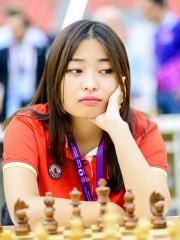
5. Ju Wenjun (b. 1991)
With an HPI of 46.57, Ju Wenjun is the 5th most famous Chinese Chess Player. Her biography has been translated into 46 different languages.
Ju Wenjun (Chinese: 居文君; pinyin: Jū Wénjūn; born 31 January 1991) is a Chinese chess grandmaster. She is the reigning five-time Women's World Champion, the reigning Women's World Blitz Chess Champion, and a two-time Women's World Rapid Chess Champion. In March 2017, she became the fifth woman to achieve a rating of 2600. She first won the title of Women's World Chess Champion in May 2018. She then defended her title in November 2018, 2020, 2023, and 2025.

6. Hou Yifan (b. 1994)
With an HPI of 46.15, Hou Yifan is the 6th most famous Chinese Chess Player. Her biography has been translated into 50 different languages.
Hou Yifan (Chinese: 侯逸凡; pinyin: Hóu Yìfán ; born 27 February 1994) is a Chinese chess grandmaster, three-time Women's World Chess Champion and professor at Peking University. She is the second-highest rated female player of all time. A chess prodigy, she was the youngest female player ever to qualify for the title of grandmaster (at the age of 14 years, 6 months, 16 days) and the youngest ever to win the Women's World Chess Championship (at age 16). At the age of 12, Hou became the youngest player ever to participate in the Women's World Championship (Yekaterinburg 2006) and the Chess Olympiad (Torino 2006). In June 2007, she became the youngest Chinese Women's Champion ever. She achieved the titles of Woman FIDE Master in January 2004, Woman Grandmaster in January 2007, and Grandmaster in August 2008. In 2010, she won the 2010 Women's World Championship in Hatay, Turkey at age 16. She won the next three championships in which the title was decided by a match (in 2011, 2013 and 2016, with a total of ten wins to zero losses and fourteen draws against three different opponents), but was either eliminated early or she declined to participate in the championships in which the title was decided by a knockout tournament (in 2012, 2015 and 2017). Hou was the third woman ever to be rated among the world's top 100 players (2014–16 and 2017–22), after Maia Chiburdanidze and Judit Polgár. After Polgár's retirement, she was widely regarded as the strongest active female player, maintaining a substantial rating lead over her peers. She has been the No. 1 ranked woman in the world since September 2015, but has been largely inactive since 2018. She was named in the BBC's 100 Women programme in 2017. In 2020, she became the youngest professor at Shenzhen University at the age of 26, and has since moved to Peking University.

7. Ye Jiangchuan (b. 1960)
With an HPI of 44.85, Ye Jiangchuan is the 7th most famous Chinese Chess Player. His biography has been translated into 15 different languages.
Ye Jiangchuan (Chinese: 葉江川; Pinyin; Yè Jiāngchuān; born November 20, 1960) is a Chinese chess grandmaster. He is the second Chinese player, after Ye Rongguang, to achieve the title of Grandmaster, which FIDE awarded him in 1993. On 1 January 2000, he became the first ever Chinese player to cross the 2600 elo rating mark.

8. Wang Yue (b. 1987)
With an HPI of 44.79, Wang Yue is the 8th most famous Chinese Chess Player. His biography has been translated into 25 different languages.
Wang Yue (Chinese: 王玥; pinyin: Wáng Yuè; born 31 March 1987) is a Chinese chess player. In 2004, he became China's 18th grandmaster at the age of 17. He is China's first player ever to break into the top 10 of the FIDE world rankings and was the highest-ever rated Chinese player, with a peak rating of 2756, until August 2015, when this record was broken by Ding Liren. In October 2007, Wang became the first Chinese player and third Asian player to cross the 2700 Elo rating mark. In October 2008, he became the world No. 11, the highest-ranking a Chinese player had ever achieved, surpassing the previous record of 17th by Ye Jiangchuan set in 2000. In January 2010, he became the first Chinese world top-ten player with a world ranking of 9. His highest world ranking to date is No. 8 in the May 2010 rating list with a rating of 2752. In the FIDE Grand Prix 2008–2010, he was a last round victory over Teimour Radjabov away from joining Levon Aronian as an automatic qualifier for the Candidates Tournament of the World Chess Championship 2012 cycle; however, Radjabov secured a draw which allowed him to win the final qualifying position. In 2008, Wang was a Communication Studies student at the College of Liberal Arts of Nankai University in Tianjin. He also played for his university club chess team.

9. Qin Kanying (b. 1974)
With an HPI of 43.82, Qin Kanying is the 9th most famous Chinese Chess Player. Her biography has been translated into 16 different languages.
Qin Kanying (simplified Chinese: 秦侃滢; traditional Chinese: 秦侃瀅; pinyin: Qín Kǎnyìng; born 2 February 1974) is a Chinese chess player who holds the FIDE title of Woman Grandmaster. She is a former Women's World Chess Championship runner-up and five-time Chinese women's champion.
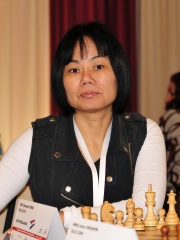
10. Peng Zhaoqin (b. 1968)
With an HPI of 43.29, Peng Zhaoqin is the 10th most famous Chinese Chess Player. Her biography has been translated into 17 different languages.
Peng Zhaoqin (Chinese: 彭肇勤; pinyin: Péng Zhàoqín; born 8 May 1968 in Guangzhou, Guangdong) is a Chinese-born Dutch chess player. In October 2004, she was the eleventh woman ever to be awarded the FIDE title of Grandmaster. She won three times the Chinese women's chess championship, in 1987, 1990 and 1993. She has resided in the Netherlands since 1996. Peng has won the Dutch women's championship an unprecedented fourteen times, landing her first title in 1997 and then winning twelve more in an uninterrupted sequence from 2000 to 2011. She tied for first with Alexandra Kosteniuk at the European Women's Chess Championship of 2004 in Dresden, and took the silver medal on tiebreak. Thanks to this result, Peng was awarded the title of Grandmaster. In the 2011 Dutch women's championship, Peng won nine games out of ten, placing a full three points ahead of her closest competitor.
People
Pantheon has 23 people classified as Chinese chess players born between 1960 and 1999. Of these 23, 23 (100.00%) of them are still alive today. The most famous living Chinese chess players include Xie Jun, Zhu Chen, and Ding Liren. As of April 2024, 1 new Chinese chess players have been added to Pantheon including Guo Qi.
Living Chinese Chess Players
Go to all RankingsXie Jun
1970 - Present
HPI: 51.96
Zhu Chen
1976 - Present
HPI: 51.56
Ding Liren
1992 - Present
HPI: 51.41
Xu Yuhua
1976 - Present
HPI: 48.48
Ju Wenjun
1991 - Present
HPI: 46.57
Hou Yifan
1994 - Present
HPI: 46.15
Ye Jiangchuan
1960 - Present
HPI: 44.85
Wang Yue
1987 - Present
HPI: 44.79
Qin Kanying
1974 - Present
HPI: 43.82
Peng Zhaoqin
1968 - Present
HPI: 43.29
Tan Zhongyi
1991 - Present
HPI: 43.12
Zhang Zhong
1978 - Present
HPI: 43.09

